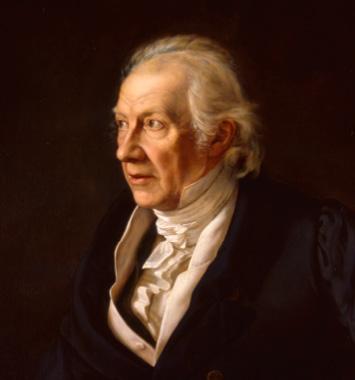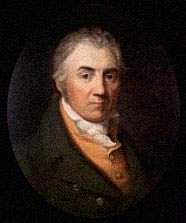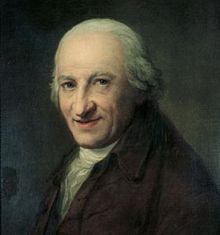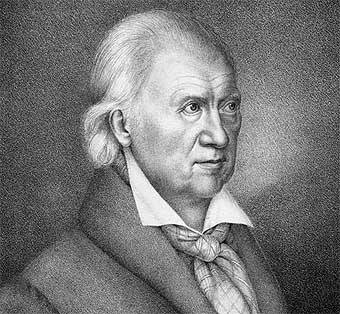Carl Friedrich Zelter
Carl Friedrich Zelter ( born December 11, 1758 in Berlin, † May 15, 1832 ) was a German musician, professor, music teacher, composer and conductor with great cultural and political influence in his time.
Life and work
The son of a master builder, he learned the same profession, acquired in 1783 of master and got into his father's business. In 1787 he built the house for his friend Friedrich Nicolai to the Brüderstraße 13. In addition to his practical work as a master mason Zelter had taught himself trained musically. He became a member of the orchestra by Karl Theophil Döbbelin in the theater at the Gendarmenmarkt in 1791 and stepped into the newly founded Sing-Akademie zu Berlin his teacher and promoter Carl Friedrich Christian Fasch. In 1800 he took over the lead after Fasch's death. In 1806 he was made an honorary member in 1809 and professor of the Royal Academy of Arts.
He founded on 10 April 1807 ten instrumentalists in the Sing-Akademie the Ripienschule for instrumental music and the so-called Friday music, 1809, the first Berlin Liedertafel whose master he was, in 1820 the Royal Institute for Church Music and a student choir. Zelter led and managed the construction of the house of his Sing-Akademie in the years 1825-1827 at the chestnut forest, near the boulevard Unter den Linden, behind the Neue Wache, in which the Maxim Gorki Theater has been located since 1952. Furthermore Zelter was a member of the renowned outlaw Society of Berlin.
Zelter wrote next to his bricklaying and conducting activities in music education memoranda and took time for many students, of which Felix Mendelssohn Bartholdy, whose sister Fanny, Otto Nicolai, Giacomo Meyerbeer or Eduard Grell are only the best known. With its memoranda Zelter laid an important foundation for the institutionalization of music education in Prussia, which affected, inter alia, which was founded in 1810 Friedrich- Wilhelm University in Berlin. So go on Zelter commitment back in 1829 the establishment of a music department at the University, and in 1833 the establishment of the Department of Music at the Royal Academy of Arts.
Musically, he was guided by Bach and Handel. He learned in 1802 Johann Wolfgang von Goethe in Weimar know, and it developed a very deep friendship with many personal encounters and a more than 30-year correspondence. Zelter was one of the few Duzfreunde Goethe and died less than two months after the " poet laureate ".
Goethe to Zelter: " In conversations Zelter is awesome and always hits the nail on the head [ ... ] He can, indeed sometimes even appear something very rough little raw at the first encounter. Alone, that is only outwardly. I know hardly anyone who would at the same time as delicate as Zelter. "
The musical work Zelter included composing symphonies, cantatas, motets, choral music, and especially of songs. Zelter received numerous poems by Goethe and sent them back to music. He gained great service to the German folk song; as derived, for example, the melody of the famous joke song " The Cuckoo and the Donkey " by him ( 1810).
The Berliners was Zelter, who was one of the most famous musicians of the city in his time, also known by various anecdotes. Around 1825 circulated the following, the author is unknown:
" Zelter just goes over the lock bridge; before him runs a sand boy watching the hit " We will overcome the bridal wreath " from Weber's Der Freischütz hums, but does not come over the top also. Finally Zelter sets with his bass voice annoyed a: , with violet blue silk '. The boy turns around and says, ' If he wants to sing the Chaplet, he can probably start him OOCH Alleene ' The Master was beaten "!
In the early 1790s Zelter married the widow Floericke that brought a son from his first marriage in the compound, but already died in 1795. In 1796 he married Julie Pappritz. She was the daughter of a Fiscal Council. Julie Zelter sang excellent and was for Carl Friedrich Zelter a mainstay at work in the Academy of Music.
Carl Friedrich Zelter's grave is preserved. It is a about 2 meter high obelisk with a plaque of the Sing- Akademie zu Berlin for their second director designed as one of the few graves in the old cemetery of the church of St. Sophia in Berlin -Mitte. The grave speech was Friedrich Schleiermacher.
Honors
According to him the Zelter Plaque was named, was founded on August 7, 1956 choirs by the Federal President Theodor Heuss. Carl Friedrich Zelter high school and the asteroid ( 15808 ) Zelter was named in his honor.
Works (selection)
- Carl Friedrich Zelter, Carl Friedrich Christian Fasch, Biography. J. F. Unger, Berlin 1801.
- The man is a dark road for 4-part gem. Choir and organ / piano. ( New edition Berlin 2006 )
- Rondo with Variations for Piano op.2
- Concerto for Viola and Orchestra in E flat major
- The violet
- Saint Paul
- Table Song ( Voss )
- Zechtalent ( Bornemann )
- Serenade
- Goethe settings (song ):
- Mind and right
- Who buys love gods?
- Vanitas vanitas vanitatum
- Mailied
- The Brittle
- The converts
- Wedding song
- Genial bustle
- First loss
- Christel
- Bundeslied
- Wanderers Night Song ( You who are from heaven )
- Wanderers Night Song ( Above all summits is Ruh ')
- Only he who knows longing
- Hot 'm not talking
- Floral Greeting
- O, give the soft pillow










